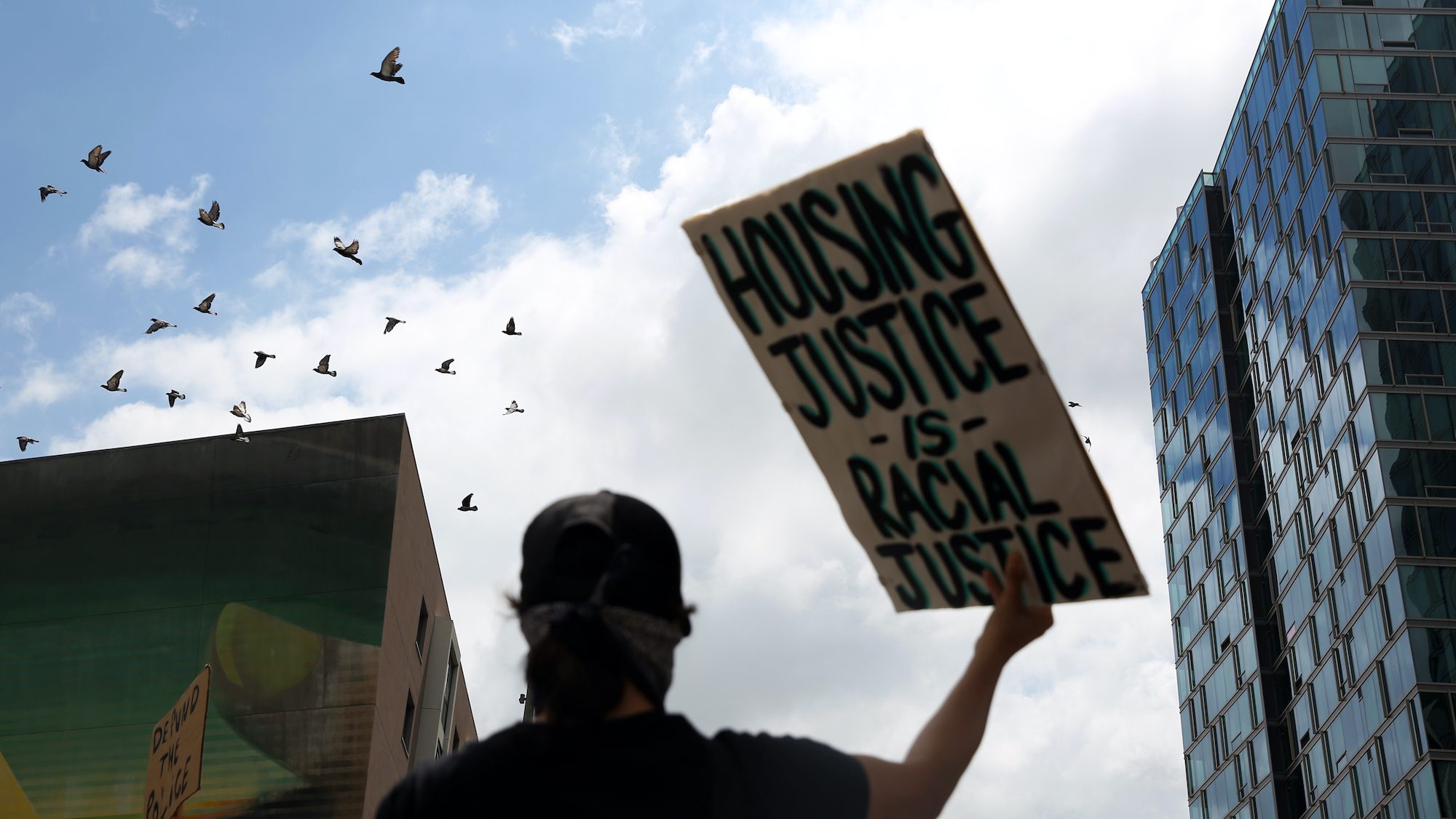
Dania Maxwell / Los Angeles Times via Getty Images
President Joe Biden is attacking racial discrimination in housing from the nation’s highest office.
In his first days as commander in chief, Biden issued orders to advance racial equity and directed the federal housing authority to rectify any policies that are injurious to communities of color. The president also acknowledged that federal, state, and local governments were directly involved in creating racist housing policies that let Black Americans fall behind in homeownership—a situation he is trying to rectify with these orders.
Biden’s actions come after a year in which highly publicized killings of Black Americans by police officers set off a wave of protests and raised awareness of the nation’s persistent racial inequities.
And it was government entities that masterminded housing discrimination decades ago, preventing Black Americans from moving into white neighborhoods, destroying prosperous communities of color with highways and other public works projects, and consigning minorities to poorer areas with fewer resources.
“The moment had arrived as a nation where we face deep racial inequities in America and system—systemic racism that has plagued our nation for far, far too long,” Biden said in a Jan. 26 press conference.
He went on to paint an alternative scenario in which millions of Americans hadn’t been denied the ability to own a home, traditionally one of the key ways Americans have built wealth to pass on to their children.
“Does anyone doubt that the whole nation will be better off?” he asked.
Acknowledging how the government perpetuated racial inequality “is important and remarkable,” says Claudia Aranda. She is a senior research associate at the Urban Institute, a nonpartisan research group based in Washington, DC. “No president has so explicitly recognized the role the federal government has played.”
The effects are persistent, resulting in low homeownership rates for Black, Hispanic, and Asian Americans, preventing many from reaching the middle class.
In the last quarter of 2020, the homeownership rate was just 44.1% for Black Americans, 49.1% for Hispanics, and 59.5% for Asians, according a quarterly report from the U.S. Census Bureau. However, it was significantly higher for white Americans, at 74.5%.
“Housing is at the root of so many issues around racial inequity in this country because—think about it,” former Secretary of Housing and Urban Development Shaun Donovan told NPR. He served under President Barack Obama from 2009 to 2014 and is now running for mayor of New York City.
“When you choose a place to live, you choose where your kids go to school. You choose access to jobs. You choose access to health care, as we’ve seen in this pandemic,” said Donovan. “And so when we’re targeting housing and making it more fair, we’re actually starting to make the American dream real again by saying everyone should have a chance at opportunity.”
What Biden’s executive orders can accomplish
Biden’s executive order on racial equity and the memorandum to the U.S. Department of Housing and Urban Development are basically fact-finding missions meant to help the government identify discrimination and barriers to communities of color through its policies and programs.
These moves “are important because they set the tone and raise awareness. I don’t think you’re going to get rid of these disparities without them,” says realtor.com® Chief Economist Danielle Hale. “But they won’t be enough to erase the racial gaps that we see in homeownership.”
Much depends on how these orders are implemented, what actions are taken by agencies like HUD once they are fully staffed up, and how the federal government chooses to follow up on them.
“We shouldn’t forget that these are only statements of intent, and not proof of action taken,” says Lizabeth Cohen, an American studies professor at Harvard University. “Other presidential administrations have announced similar commitments, but the inequality of access to housing has persisted.”
Biden is expected to undo some of Donald Trump’s actions
Biden tapped Rep. Marcia Fudge, who formerly led the Congressional Black Caucus, to head up HUD. The Ohio Democrat is expected to restore a rule that would prevent the housing industry from taking certain actions that hurt Blacks and Hispanics, even though they may not seem discriminatory.
Change is a gradual process
Housing experts cautioned that centuries of injustices can’t be undone quickly.
“It’s difficult even for the leader of the free world to overcome systemic racism,” says LaDale Winling, a history professor at Virginia Polytechnic Institute and State University, aka Virginia Tech. “But the president can staff agencies and promote legislation and partner with local communities and the private sector to begin to dismantle these structures of inequality.
“Joe Biden can’t do it all, but Joe Biden can start a process,” he says.
The post President Biden Confronts Discrimination in U.S. Housing Policies—Will It Make a Difference? appeared first on Real Estate News & Insights | realtor.com®.
